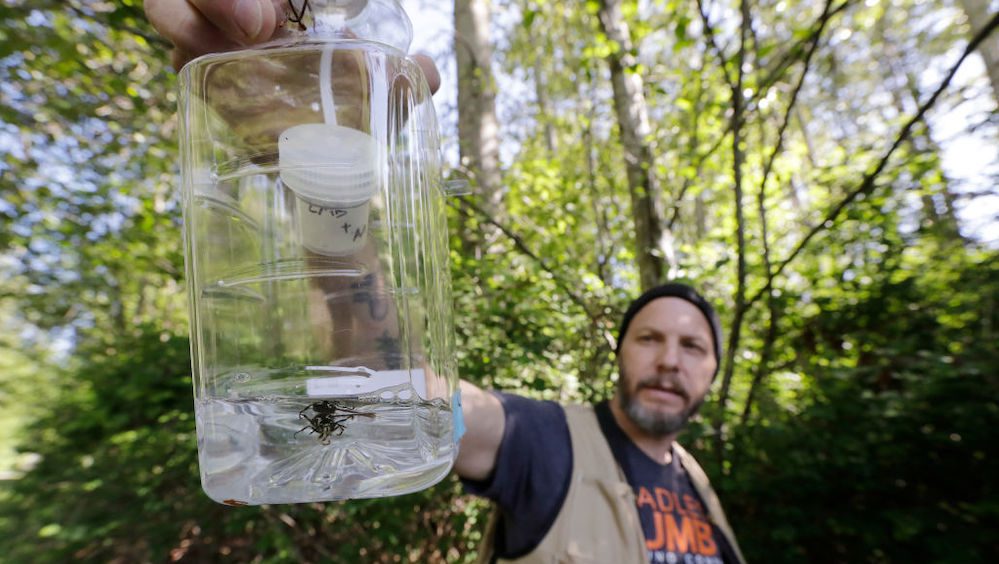
Elaine Thompson / POOL / AFP) (Photo by ELAINE THOMPSON/POOL/AFP via Getty Images
Just when you thought 2020 couldn’t get any crazier, an invasive, seemingly terrifying species of insect given the not-so-subtle nickname “murder hornets” are causing quite a panic in the U.S.
Also known as Asian giant hornets, these insects are native to several regions in Asia, but reports from December 2019 confirmed that the hornets had, in fact, been sighted in Washington state.
But what did these hornets do to earn such a horror-movie-ready moniker?
“Asian giant hornets are known to attack colonies of honey bees and slaughter the bees by decapitating them one by one,” says Michael Deutsch, an urban entomologist with Arrow Exterminating Co. on Long Island, NY. “It only requires a small number of giant hornets to destroy a colony of hundreds or even thousands of honey bees.” Um, OK…
But don’t go building a bomb shelter or taking drastic measures to protect your home just yet. We spoke with bug experts to get down to the truth about this pest. And it turns out, things aren’t as bad as they seem. Here’s everything you need to know about Asian giant hornets.
What is a ‘murder hornet’?
In December 2019, scientists confirmed a sighting of the Asian giant hornet species in Washington state. A few months before that, entomologists saw the critters twice in British Columbia.
And while these hornets are ruthless when it comes to killing other insects (remember the whole “decapitating honey bees” thing?), they don’t count humans among their enemies. (It’s worth repeating: You are not their enemy!) Still, like any wasp or bee, they will sting if they feel threatened.
“Reports of human attacks are relatively rare,” Deutsch says. “However, should you encounter a nesting site, you need to remain calm and slowly back away. If these hornets perceive a threat to their colony, they can become aggressive and attack an intruder to neutralize that threat.”
Michelle Infante-Casella, an agricultural agent and professor at Rutgers University, says a person would need to be stung multiple times to incur death from the venom of the Asian giant hornet.

Elaine Thompson / POOL / AFP) (Photo by ELAINE THOMPSON/POOL/AFP via Getty Images
How concerned should we be about murder hornets?
Before you panic, know that the Washington state Department of Agriculture has not confirmed any sightings of Asian giant hornets in 2020. However, some believe there’s a chance they might start showing up again once the weather gets warmer.
Deutsch says the biggest threat at the moment is to local beekeepers whose hives could be at risk if Asian giant hornets really are here to stay.
But in the event that Asian giant hornets do move into the U.S. for good, they aren’t going to build a hive on the side of your home.
“They nest in the ground and in decaying logs,” Infante-Casella says. “Asian giant hornets do not live in trees or nest like other hornets in paperlike or mud nests.”
That’s good news if your home has been inviting to bees or wasps in the past. However, the downfall here is that Asian giant hornets’ nests will be more difficult to spot.
But spotting the actual hornets flying around might be considerably less of a challenge.
Deutsch says Asian giant hornets are about twice the size of any hornets found in the U.S., approximately 1.5 to 2 inches long. They have distinct coloring, as well, with a yellow head, while typical European hornets (the ones most commonly seen in the U.S.) have a reddish-brown head and are yellow around the face.
If you think you see a murder hornet
If you think you have a hive of Asian giant hornets on your property, call a pest control company. Eradicating an infestation is not a job for an amateur.
“The sting from the Asian hornet contains a neurotoxin,” Deutsch says. “The victim will likely need emergency medical intervention. Human deaths have been reported in Japan after multiple stings.”
That also means you shouldn’t go invest in bug killer.
“We ask the public to not indiscriminately kill bees, wasps, or hornets since they are very important as pollinators and predators of insect pests in our environment,” Infante-Casella says. “If you see a large hornet this summer, it most likely will be a look-alike hornet, like a cicada killer wasp. For proper identification, contact your local Co-operative Extension Office in the county where you live.”
The post ‘Murder Hornets’ and Your Home: Here’s How Concerned You Should Really Be appeared first on Real Estate News & Insights | realtor.com®.
No comments:
Post a Comment